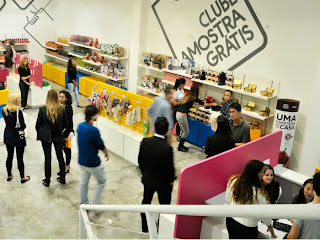
Can handing out free products reduce the amount of new products that fail when entering the market?
A concept born in Tokyo a couple of years ago thinks it can. It is a shop that looks normal, only with that difference that everything is free. Consumers take home products and review them.
A mix of product research and word of mouth marketing. Manufacturers of products like deodorants, biscuits and clothing can test their products in a real store. And they can use the feedback provided by consumers to possibly tweak the product. If the consumer likes the products, this will get out as well. Especially if the store provides a good online platform that allows people to easily share the product information.
Recently Clube Amostra Grátis (Free Sample Club) opened in São Paulo. A store operating similar as described above. The customer signs up online, gets a fidelty card when she first visits the store and then can take home products for testing and review. The system is based on credits, which are awarded for each completed review. These credits can be exchanged for other products in the shop.
Coined tryvertising it seems like a business model with advantages for both consumers and companies. Consumers pay a one time fee of R$50 (about 20 euro) to access the store. And it is quite successful, in a couple of days the store got 8000 signups. The 90 brands that are available in the store buy their shelf space from the store owner.
Back to the basic question: can all of this reduce the number of product failures?
I don't think so as it only impacts the very final stage of the product development process. At this point the company already has invested a lot of money in the product to have it completely cancelled based on a couple of customers reviews. A little bit of product or package tweaking however is possible.
But the real power of this system is the switch from mass advertising to an more customer centered approach.

No comments:
Post a Comment